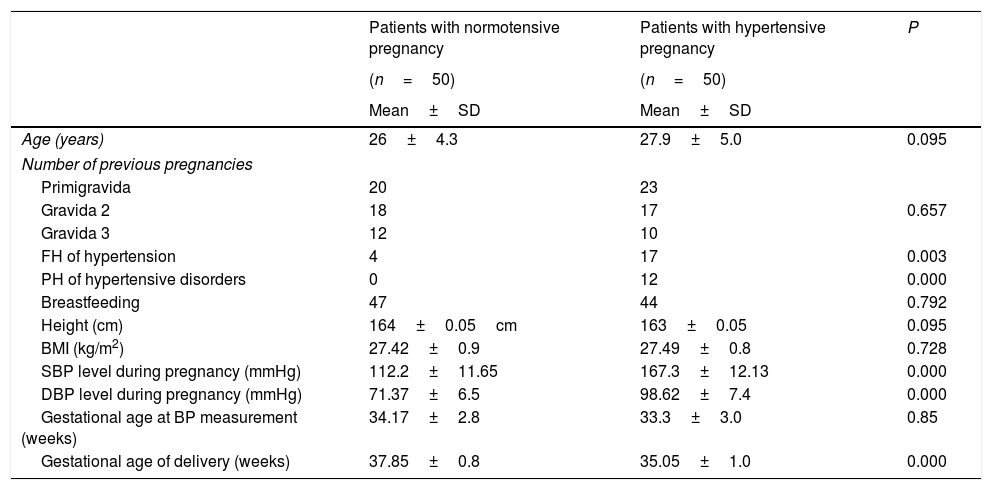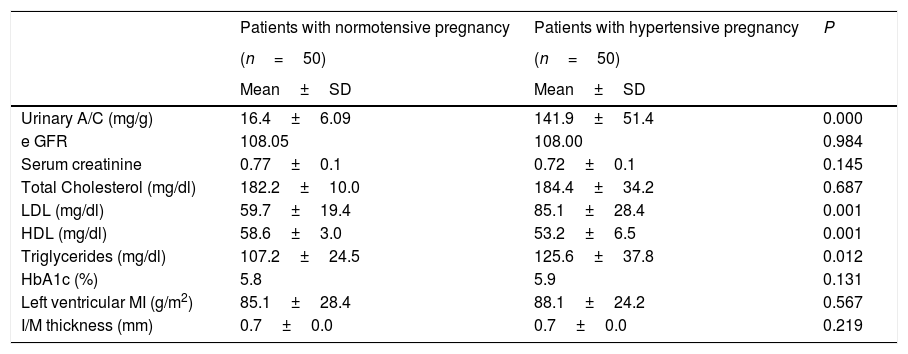Hypertensive pregnancy was recognized as a risk factor of cardiovascular events. The aim of our study was to evaluate the short-term cardiovascular risk in normotensive females with previous hypertensive pregnancy.
Material and methodsA prospective cohort study was conducted on 50 females with previous normotensive pregnancy and 50 females with previous hypertensive pregnancy. All patients were re-evaluated three months postpartum to be sure that they became normotensive. One year postpartum, all patients were subjected to renal function tests, urinary albumin/creatinine ratio for microalbuminuria, glycated hemoglobin, complete lipid profile, echocardiographic assessment of left ventricular mass index and carotid duplex for measurement of intimal–medial thickness, presence of carotid plaques and stenosis.
ResultsNo significant difference between both groups regarding blood pressure level three months postpartum. No significant difference between both groups regarding serum creatinine. Patients with previous hypertensive pregnancy group had significantly higher microalbuminuria compared with previous normotensive pregnancy group (p=0.000). Serum LDL and triglycerides were significantly higher however HDL was significantly lower in those with previous hypertensive pregnancy, however all lipid profile measures were within normal range. No significant difference between both groups regarding left ventricular mass index and carotid intima-media thickness. No evidence of carotid plaques or stenosis in both groups.
ConclusionsPrevious hypertensive pregnancy was associated with increased risk of microalbuminuria at short term level even after normalization of blood pressure post-partum. Longer period of follow up is required to establish the potential cardiovascular risk in these patients.
El trastorno hipertensivo del embarazo ha sido reconocido como un factor de riesgo de episodios cardiovasculares. El objetivo de nuestro estudio fue evaluar el riesgo cardiovascular a corto plazo en mujeres normotensas con trastorno hipertensivo del embarazo previo.
Material y métodosSe realizó un estudio prospectivo de cohorte en 50 mujeres con embarazo normotenso previo y 50 mujeres con trastorno hipertensivo del embarazo. Todas las pacientes fueron re-evaluadas a los 3 meses del parto, para asegurarnos de que eran normotensas. Transcurrido un año del parto, se realizaron pruebas de función renal, albúmina en la orina/ratio de creatinina para microalbuminuria, hemoglobina glucosilada, perfil lipídico completo, valoración ecocardiográfica del índice de masa ventricular izquierda y dúplex carotídeo para medir el grosor íntima-media, presencia de placas carotideas y estenosis, en todas las pacientes.
ResultadosNo se encontraron diferencias significativas entre ambos grupos en cuanto a nivel de presión arterial, transcurridos 3 meses del parto. No se encontraron diferencias significativas entre ambos grupos en cuanto a creatinina sérica. El grupo de pacientes con trastorno hipertensivo del embarazo tuvo un mayor nivel de microalbuminuria en comparación con el grupo de embarazo normotenso previo (p=0,000). Los niveles séricos de LDL y triglicéridos fueron significativamente mayores, pero el nivel de HDL fue significativamente menor en aquellas mujeres con trastorno hipertensivo del embarazo previo, aunque el perfil lipídico de todas las pacientes se situó en valores normales. No se encontraron diferencias significativas entre ambos grupos en cuanto a índice de masa ventricular izquierda y grosor íntima-media carotideo. No se encontró evidencia de placas carotídeas ni estenosis en ninguno de los grupos.
ConclusionesEl trastorno hipertensivo del embarazo previo se asoció a un incremento del riesgo de microalbuminuria a corto plazo, tras la normalización de la presión arterial posparto. Se precisa un periodo de seguimiento más largo para establecer el riesgo cardiovascular potencial en estas pacientes.








